#Queer Reading
Explore tagged Tumblr posts
Text
It’s literally not my fault that the themes of Breaking Bad become that much stronger if you read Walter as a closeted gay man… like where to even start okay it’s 2008 and this guy is so, so insecure in his masculinity and so, so resentful of his picket fence family life. He’s done what he was “supposed” to do by societal standards and he still doesn’t feel like enough of a man compared to his brodude brother-in-law specifically. He can’t escape the feeling that something is missing, that it’s all a charade, and he finds it hard to believe the rest of the people in his life really are content with this lifestyle. Nobody seems to understand, and he hates them all for not seeing how unhappy he is. He gets his cancer diagnosis and is suddenly acutely aware that he feels burdened and unfulfilled by the life he’s built for himself, and that time is running out to change things.
It’s when he sees Jesse Pinkman fall half naked out of a window that everything changes. He’s pretty, and young, and floundering without guidance or a support system. He desperately craves human connection and lacks the self-esteem to take his life in any particular direction without someone instructing him. He’s grieving his aunt, the only person he had looking out for him, who died of cancer. He already views Walter as an authority figure. He’s alone.
And with Jesse around, Walter doesn’t have to come to terms with anything about himself that might challenge his masculinity, because it isn’t an equal relationship. Because he’s still “the man” in this dynamic, the one with the power, the one calling the shots, the dominant one, the firm hand. Moreso than in his relationship with Skyler, who refuses to be bullied into the role he would assign her, that of the submissive, subservient little wife who looks to him for guidance and permission. As a criminal, Walt can express care for another man in the only way that traditional masculinity would deem acceptable; through violence. His love language is violence. Violence toward Jesse and violence on Jesse’s behalf. He runs over two men with a car for Jesse. He kills Jane and Mike, a romantic and paternal threat respectively, because they were going to take Jesse away from him. He tries on occasion to verbalize their relationship into something more traditionally familial, as if saying it might make it true, but it never quite fits the mold exactly. He reasserts, over and over again in what he later admits is a lie, that he is doing this for his family, that everything he does is an extension of his masculine role rather than deviant from it. He would kill and die for Jesse, he does kill and die for Jesse. In fact, in a story of self-actualization that still has Walt cling to his delusions of grandeur up until the very end (almost as though becoming Heisenberg wasn’t actually self-actualization so much as an escapist fantasy) his arc concludes with him actually self-actualizing by committing one last act of violence on Jesse’s behalf. In Ozymandias, he tells Jesse about Jane as a way of playing into Jesse’s worst fear that Walter never cared about him, that everything they did to and for each other meant nothing. Walter’s last act on Earth is a refutation of that; it’s an admission of care. His last act of self-actualization was a confession of love for another man.
#idk i feel like every time i talk ab the queer elements of brba i always get such strong pushback#like ppl feel uncomfortable applying a queer lens to this sacred text on masculinity#even though that theme only becomes stronger and more precise through a queer lens imo#all this to say#if Walter had come out he would make being a top his entire personality#walter white#jesse pinkman#waltjesse#breaking bad#brba#queer reading
335 notes
·
View notes
Text
Jayce is with Mel because it's easier. A queer reading of his relationship with Mel and Viktor reveals this dynamic: Viktor's declining health serves as a painful reminder of Jayce's original HexTech goals, yet he's pulled into the politics and trade that he finds easier to navigate.
Jayce struggles between focusing on trade and his true purpose, easily swayed by what feels simpler. His personal relationships mirror this; he connects with Mel due to their similar social standings—both are affluent and politically involved—while Viktor, from the Under City, is different in background and is disabled.
Jayce frequently shifts between Mel and Viktor, exemplified when he leaves Mel after their fling to visit Viktor in the hospital. In the painting scene (heaven's forbade I ever remember what happens each specific episode) scene, while discussing Viktor's prognosis with Mel, she distracts him by sharing her own trauma. I'm not sure if I want to consider this morally unsound, because I understand why Mel would do that, but the point is she did distract Jayce from his own issue.
In that same scene Jayce claims that nothing feels impossible with Mel, highlighting his comfort in her presence. Although he, dare I say, is in love with Viktor, his anxiety about his condition prompt him to seek solace in Mel. And that's just because that's how Jayce's character is. He's self-serving, and making an effort to protect his emotional state.
#this guy can't stand feeling bad even for a second#of course I haven't finished the first season yet so my opinion is bound to change#snd if it does I'll write about it more#i just think it’s interesting#honest opinion on Mel#i'm scared of her#I love her character and how she's affecting the plot#but holy damn if I knew her IRL I'd keep us at a distance if 20 miles at minimum#arcane#viktor arcane#jayvik#mel arcane#mel medarda#jayce talis#jayce x viktor#mel x jayce#queer reading
113 notes
·
View notes
Text
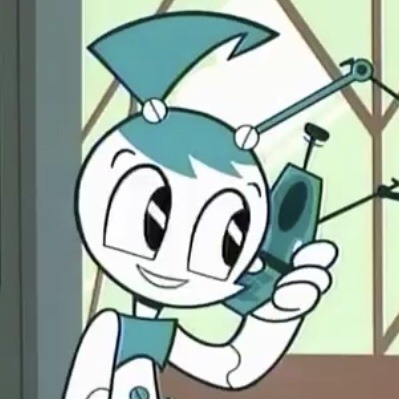
Okay but like. Jenny is trans-coded and I think it's a really fascinating part of her story.
She wasn't born like a human girl but desperately desires to be one. She hates her old name (xj-9). Gets excited when she's called "a daughter" etc etc. Her experience AS a robot girl is OBJECTIVELY different from a human girl's. Yet... that doesn't make her any less of a girl!
And I think with the reading of her story as Trans.. you know what episode (to me) becomes FAR MORE interesting?
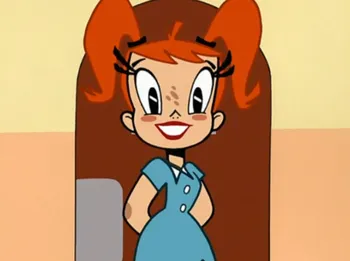
Raggedy Android.
For those unaware (aside from this being listed as "one of the creepiest episodes in cartoon history" which. like. IT IS.) In this episode Jenny gets excluded from a hangout spot BECAUSE she's a robot.
Eventually this leads to her putting on her human exo suit. She LOOKS and is TREATED like a normal girl for once!
But there's a cost to this.
The exo suit begins to control her against her will. Forcing her to sit out of fights. Jenny isn't herself.
The suit tells her "this is how normal girls behave"
The episode, of course, ends with Jenny busting out of the suit and being herself!
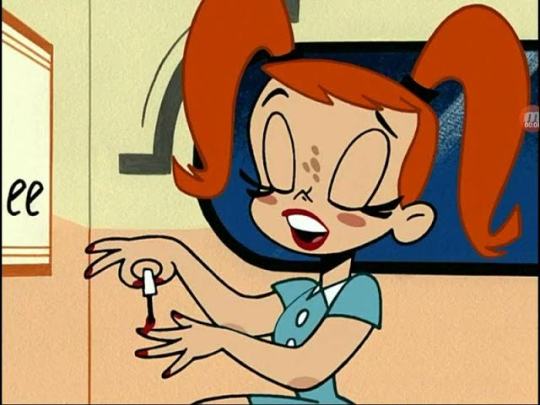
To me this episode is really interesting in the context of the accidental trans-coding of Jenny because it's something Trans people DO have to face!
"If you don't act super feminine as a trans woman than you're not a real woman!" Some might say.
And if that's how you want to present as a trans-woman that's entirely valid!
But that should be YOUR CHOICE!
Trans-men should be allowed to be feminine, trans-women should be allowed to be masculine! Nonbinary people are allowed to be some other third thing.
Just because Jenny fights crime and is made of metal doesn't make her ANY less of a girl than anyone else and that's why I really love this episode!
76 notes
·
View notes
Text
There's lots of gay subtext in Ace Attorney.
But when looking specifically at subtext that might be intentionally put in the narrative by the creators with the intention that the character in question is actually gay, I think the main character with the most evidence behind this is actually Apollo Justice.
Our other main characters, Phoenix Wright and Athena Cykes both have obvious subtextually heteronormative romantic partners. To an adult, straight, culturally normative audience, Phoenix Wright and Maya Fey read normatively as an obvious romantic pairing. This is also the case for Athena Cykes and Simon Blackquill. In Great Ace Attorney the same can be said for Ryuunosuke and Susato.
I repeat– to an adult, straight culturally normative audience, the romantic subtext between these characters is clear. If you showed these games to an American movie going public, that would be the obvious read by the audience.
Yes, each of these characters, Phoenix, Athena, and Ryuunosuke also have strong queer romantic subtext with another character. (Miles, Juniper, and Kazuma respectively).
However, that's not my point. It's not significant that each of the other three characters has homosexual relationship subtext.
It is significant that Apollo Justice does not have a character with whom he has heteronormative romantic subtext.
The closest thing Apollo Justice has to a "heteronormative romantic subtext" is Trucy Wright– whom we, the audience know is his sister.
And yes, you can make the argument that there is deliberate incestuous subtext between them– a kind of Luke/Leia style relationship with which the audience is teased by the narrative. Dhurke brings it up directly in Spirit of Justice.
However, this is still not a heterenormative subtext, because of its taboo nature. More taboo, culturally at this point, than homosexuality.
On top of the lack of heteronormative romantic subtext, Apollo also is on the receiving end some of the strongest and most overt of the homosexual subtext in the series.
There is of course the famous "meet cute" introduction between Apollo and Klavier–
“I must say, I'm used to being inspected by the ladies... but this is the first time I've felt this way with another man.”
This is without question overt homosexual subtext.
However, there is another, even more subtextually clearly defined moment in Dual Destinies. Honestly, the subtext is all over Dual Destinies in the way Apollo reacts to Clay Terran's death (basically completely losing it) but there's one particular moment that deliberately draws your attention to the relationship in a queer way.
In one of the last cases of the game, everyone is delicately trying to explain to the judge that Aura Blackquill was in love with Metis Cykes (who was murdered) in a queer way. It's a big “they’re lesbians, harold” moment.
And then the conversation immediately turns to Apollo Justice and how he’s just had someone who was “important to him” murdered, too.
The narrative specifically draws you attention to the relationship that Aura and Metis had, and compares it to the relationship between Apollo and Clay.
You are specifically invited to speculate about what kind of important relationship Clay and Apollo had, and why Apollo has been affected so incredibly deeply.
So yeah. Between Clay, Klavier, and the lack of anything resembling a heteronormative romantic relationship for Apollo in the games, I think he has the strongest narrative evidence that he's actually being written deliberately as gay.
#apollo justice#klapollo#claypollo#ace attorney#ace attorney meta#queer subtext#queer reading#queer media#media analysis#media literacy#���⚔️
352 notes
·
View notes
Text
My thoughts on LGBTQ and LOTR.
So here's the thing -- Tolkien was a devout Catholic. He also lived in the early/mid 20th century, and was a man of his time. As such, it is highly unlikely that he intended for Sam and Frodo, or indeed anyone else in LOTR to be LBGTQ.
BUT, it is also important to remember that it does not matter what he actually intended. The thing about literature, or art in general, is that in the reading and in the experiencing, it comes to transcend the author's original intentions and takes on an independent life of its own.
316 notes
·
View notes
Text
For those of us who are looking to read more queer this 2024, I have a couple of resources that might help! First, our affiliate list on Bookshop.org; for the fans of reading books. Second, our article list; for those article readers who might be a fan (or want to become a fan of) queer history!
#queer history#queer#lgbt#lgbt history#gay history#lesbian history#transgender history#transgender#making queer history#queer books#queer reading#lgbt reading#lgbt books
339 notes
·
View notes
Text
I'm not saying this is canon or anything, obviously it's hard to apply modern conceptions to older writings and we all bring ourselves to our interpretations. That said, there's something really special to me as a queer woman-adjacent person about how Mina loves Lucy and Johnathan. I still think about the scene where Mina watched Lucy sleep and thought about how beautiful she was, how her fiancé will be lucky to see her like this. She segways into thinking about how women in the future will be able to propose to their husbands-to-be. I think Mina has the same love in her voice when looking after Lucy and when looking after Johnathan. And of course finding someone beautiful doesn't have to be romantic. I just like reading Mina as bi/queer and drawing on scenes like these.
#slimeposts#re: dracula#dracula daily#mina murray#or#mina harker#! <3 good for her <3#queer reading#idk how to tag#i just think mina has a lot of love to give and she should be allowed to kiss lucy if she wants to
531 notes
·
View notes
Text

This was a key passage that was left niggling at me. It was thanks to Pale that I found out what queerplatonic relationships are, and it felt like things really started clicking into place. I am now comfortable saying that this passage was a key datapoint of wildbow's tendency to include relationships that blur conventional boundaries, for good and for ill. It's very queer and absolutely fascinating and I love it.
#wormblr#worm#worm web serial#aisha laborn#alec vasil#wildbow#queer#queerplatonic#media analysis#queer reading
29 notes
·
View notes
Text

Hammajang Luck by Makana Yamamoto
Queer book published 2025
HAMMAJANG | adjective. Definition: In a disorderly or chaotic state; messed up. Chiefly in predicative use, esp. in all hammajang. Etymology: A borrowing from Hawaiian Pidgin. Source: Oxford English Dictionary.
Edie is done with crime. Eight years behind bars changes a person - costs them too much time with too many of the people who need them most.
And it's all Angel's fault. She sold Edie out in what should have been the greatest moment of their lives. Instead, Edie was shipped off to the icy prison planet spinning far below the soaring skybridges and neon catacombs of Kepler space station - of home - to spend the best part of a decade alone.
But then a chance for early parole appears out of nowhere and Edie steps into the pallid sunlight to find none other than Angel waiting - and she has an offer.
One last job. One last deal. One last target. The trillionaire tech god they failed to bring down last time. There's just one thing Edie needs to do - trust Angel again - which also happens to be the last thing Edie wants to do. What could possibly go all hammajang about this plan?
Ocean's 8 meets Blade Runner in this trail-blazing debut science fiction novel and swashbuckling love letter to Hawai'i about being forced to find a new home and striving to build a better one - unmissable for fans of Gideon the Ninth by Tamsyn Muir and Six of Crows by Leigh Bardugo.
All queer books | All queer books published 2025 | Main blog
#sci fi#anti prison#Science Fiction#Cyberpunk#Fantasy#new release#Queer#LGBTQIA+#Fiction#Lesbian#Romance#Science Fiction Fantasy#queer#queer books#2025 queer books#new queer books#publishing#queer publishing#2025#2025 releases#newly released#newly released in 2025#queer literature#queer stories#queer reading#op#Hammajang Luck#Makana Yamamoto#hammajang#fiction
16 notes
·
View notes
Text
If you like the vibes of Ascended Astarion but a text that recognizes his power over you BOY DO I HAVE A BOOK FOR YOU!
An Empty Embrace by Cyril Mezden
It’s essentially a naive cleric and his adventuring party getting transported to a world very much like Barovia. They meet village people that are suffering and they are trying to figure out what this mysterious figure at night that is tormenting them. Queue the cleric meeting a very suave vampire and starting to question himself. The vampire is very very dark Astarion vibes, controlling and having a thing for control. Things happen it’s spicy and you see what the cleric battles with emotionally trying to come to terms with everything he is feeling and a bit of spice.
The other main characters in the book are also fantastic!!! We have a queer wlw wizard and half orc barbarian who are intriguing and fu. To see their adventures as well. Ensue epic battles that are very tragic inspired but the adventuring party may not be fully prepared for it.
I read this book months ago and still think about how fun it is. If you want the vibes of Ascended Astarion wreaking havoc on a Barovia type place, adventuring party being trapped and having to solve why this town is cursed I would suggest this book! It is very fun and felt like a ttrpg one shot to me. If you read it let me know what you think!
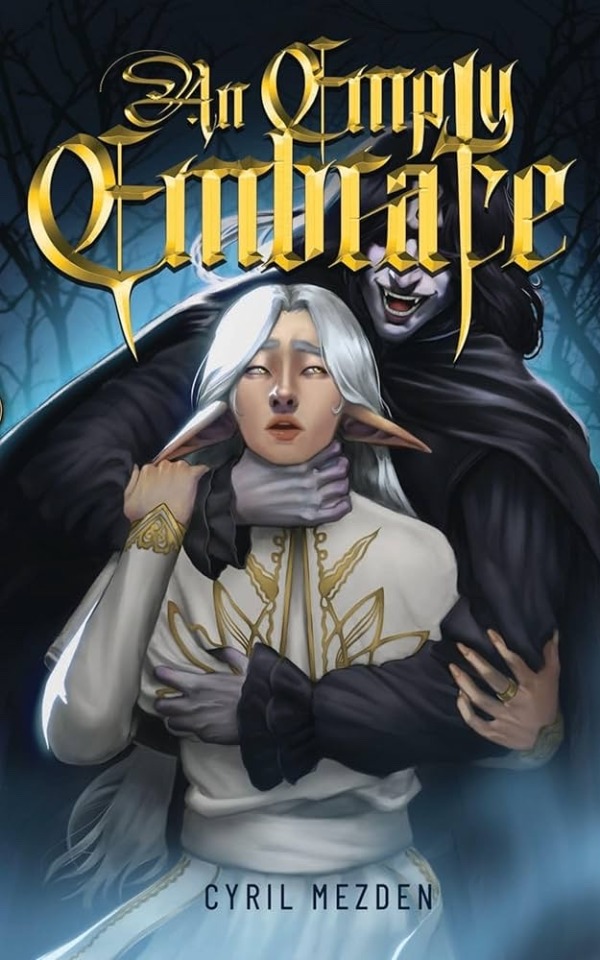
#an empty embrace#book recommendations#queer books#queer reading#ac#ascended astarion#baldurs gate 3#astarion#bg3#books#trans books#ttrpgs#ttrpg book#dnd#barovia#curse of strahd
28 notes
·
View notes
Text
I’m fully aware that most of the casual HSR playerbase have not played or even experienced Honkai Impact 3rd. However, given the existing precedent for queer subtext and relationships in Hi3rd as well as how Hoyo goes about it under CCP censorship laws, what we know about Robin’s character (lesbian colours, song reference to Emily Dickinson, flirting with March 7th, etc.) appears to be one of the more blatant instances of queer subtext by the creators.
All I’m saying is that I’m prepared for chuds and non-believers to be put in their place yet again when Robin officially drops. It’s really the Elysia drama all over again, and if you know, you know.
#anywho I wish all hsr players a happy post lesbian visibility week#praise be lesbian Jesus Elysia#praise be lesbian queen Robin#honkai star rail#hsr#honkai impact 3rd#hi3rd#elysia#robin#queer coding#queer subtext#queer reading#hoyoverse
48 notes
·
View notes
Text
the quote:
"I seek not gaiety nor mirth, not the bright voluptuousness of much sunshine and sparkling waters which please the young and gay. I am no longer young; and my heart, through weary years of mourning over the dead, is not attuned to mirth."
my analysis: so dracula isn't young, but he is gay
#dracula daily#may 7th#dracula#vampires#queer fiction#queer reading#queer analysis#gay#duh#literature#gothic literature#fangs lace and youre gonna tell me it isn't queer????
53 notes
·
View notes
Text
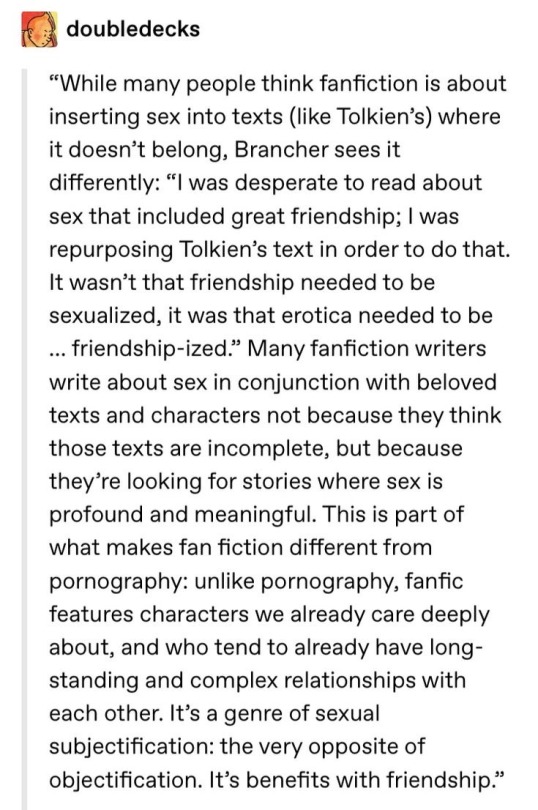
[ID: Screenshot of a tumblr post from @doubledecks with a quote from an unknown source, which reads:
"While many people think fanfiction is about inserting sex into texts (like Tolkien's) where it doesn't belong, Brancher sees it differently: "I was desperate to read about sex that included great friendship; I was repurposing Tolkien's text in order to do that. It wasn't that friendship needed to be sexualized, it was that erotica needed to be ... friendship-ized." Many fanfiction writers write about sex in conjunction with beloved texts and characters not because they think those texts are incomplete, but because they're looking for stories where sex is profound and meaningful. This is part of what makes fan fiction different from pornography: unlike pornography, fanfic features characters we already care deeply about, and who tend to already have longstanding and complex relationships with each other. It's a genre of sexual subjectification: the very opposite of objectification. It's benefits with friendship." End ID]
does anybody know where this quote is from? i found it in my camera roll and i think its an absolutely brilliant way of looking at queer readings of sam/frodo as well as slash fiction in general. i think its from an essay or article or something and i want to read the whole thing. if anyone knows where its from pls lmk!
edit: it’s been found! it’s from “The Fanfiction Reader: Folk Tales for the Digital Age” by Francesca Coppa!
#lord of the rings#samfro#sam/frodo#samwise gamgee#frodo baggins#slash fanfiction#queer reading#the lord of the rings#ao3#fanfiction#fanfic#fan studies#.txt#alex talks
85 notes
·
View notes
Text
Despite a ton of queer subtext, the actual canonical text of Ace Attorney is deeply homophobic and heteronormative.
Homosexuality and queerness are never directly referenced or mentioned at all in the series. There is never a moment in the series where it is directly discussed that non-straight is a thing you can be.
However, there are a few characters who are implied to be non-straight and these cases are handled in the same way every time.
Male homosexual stereotypes: men who wear cosmetics, are flashy and limp wristed. These queer stereotype men are treated with derision by the characters and the text. At one point Phoenix Wright directly calls another man (Redd White) a "fruitcake" which is a slur against homosexual men.
Implied lesbians: Specifically Lana Skye and Aura Blackquill. In both cases these characters are hinted to have romantic feelings for another woman. In both these cases, the characters around them do not reference this directly and instead act embarrassed on the woman's behalf. Ema hurries to explain that Lana's attraction to Mia is "an intellectual attraction", and in court, everyone is nervous to explain to the judge that Aura was in romantic love with Metis and it's never said directly, only hinted around with embarrassment.
In both cases, male and female, the characters of Ace Attorney act in a way that suggests that homosexuality in the Ace Attorney universe is something embarrassing and shameful.
At no point in the series is there ever a moment where homosexual behavior and presentation isn't treated as something embarrassing and shameful.
#homophobia in fiction#ace attorney#ace attorney meta#queer reading#queer subtext#phoenix wright#aurametis#lanamia#redd white#florent l'belle#jean armstrong#media analysis#lana skye#aura blackquill
232 notes
·
View notes
Text
Lost S1 Rewatch after 20 years - scattered thoughts
Charlie is creepy as fuck. He's extremely volatile and while I understand that he's going through recovery and that's certainly tough on anybody, let alone a plane-crush survivor stranded on a crazy island, I still read his behavior towards Claire and, to a lesser extent, Hurley, kinda creepy and not-cool weird.
Justice for Shannon. Let's give her credit for impromptu translating from French into English while everybody gives her shit because she's not sure whether she can do it or not and doesn't want to mess up. Sorry if she's just a normie human being and not a highly-trained torturer or a crafty confidence man. Yeah, we should apologize to her.
Not looking for Claire was a dick move. The girl is about to give birth in 1-2 weeks, gets abducted by a someone who infiltrated the survivors, tried to murder Charlie and is now possibly hiding with Claire in the jungle... for almost a week? And people be like: well, I guess shit happens, amirite? It irks me a lot, ngl.
The structure of the episodes, the command of narrative techniques, the use of very specific and recurrent symbols... superb writing. Yes, there are some minor mistakes, some inconsistencies and some stuff that I personally don't like and yet... After 20 year this season still EATS.
After 20 years I still hate the "Love Triangle" trope. I hated it 20 years ago and things haven't changed, maybe they even got worse. Yes, I'm referring to the Kate-Jack-Saywer of it all. I used to ship Kate and Jack but, upon rewatching s1, I find that Jack is sometimes a bit of a dick towards Kate while Kate unnecessarily keeps doing these little manipulations when it's clear as day that Jack's got it bad for her and she already has him wrapped around her finger. I like that Kate and Saywer immediately clock each other as outcasts and outlaws and flirt their way around it but I think Kate dumps on him the same attitude Jack dumps on her and I'm like "please leave my man James out of your little machinations to play the doctor, thank you".
Speaking of, I know that a queer watsonian reading of Lost is... well, I don't want to say "impossible" because nothing is, but it is not an easy feat. Having said that, my headcanon is that Jack and Sawyer are the real soullmates, their chemistry is off the charts. I know that they've created these two cishet characters exuding straightness from every pore but there's so much of that between the two of them that it actually circles back to being very queer when they interact.
#lost#lost abc#abc lost#lost rewatch#lost tv series#charlie pace#shannon rutherford#lost season 1#lost rewatch s1#claire littleton#jack shephard#james sawyer ford#queer reading
49 notes
·
View notes